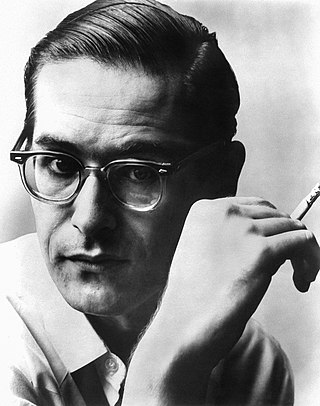
William John Evans was an American jazz pianist and composer who worked primarily as the leader of his trio. His use of impressionist harmony, block chords, innovative chord voicings, and trademark rhythmically independent "singing" melodic lines continue to influence jazz pianists today.

Portrait in Jazz is the fifth studio album by American jazz pianist Bill Evans as a leader, released in 1960. It is the first of only two studio albums to be recorded with his famous trio featuring bassist Scott LaFaro and drummer Paul Motian.

Explorations is an album by jazz pianist Bill Evans that was originally released by Riverside Records in 1961. It was the second and final studio album Evans recorded with his classic trio featuring Scott LaFaro on bass and Paul Motian on drums.
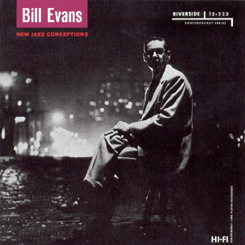
New Jazz Conceptions is the debut album by jazz pianist Bill Evans, recorded in two sessions during September 1956 for Riverside Records.
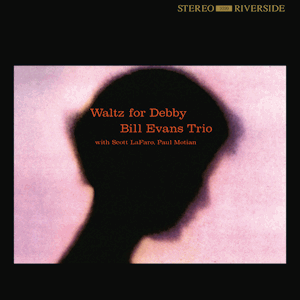
Waltz for Debby is a live album by jazz pianist and composer Bill Evans and his trio consisting of Evans, bassist Scott LaFaro, and drummer Paul Motian. It was released in 1962.
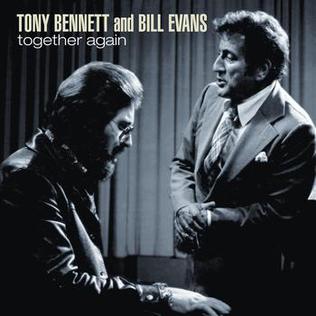
Together Again is a 1977 studio album by singer Tony Bennett and jazz pianist Bill Evans. It was originally issued on Bennett's own Improv Records label, which went out of business later that year, but was subsequently reissued on Concord.

Know What I Mean? is a 1962 jazz album by alto saxophonist Julian "Cannonball" Adderley, accompanied by Bill Evans and the rhythm section of the Modern Jazz Quartet. It was released on the Riverside label as RLP-433.

You Must Believe in Spring is an album by American jazz pianist Bill Evans, recorded by him with bassist Eddie Gómez and drummer Eliot Zigmund in August 1977 and released in February 1981, shortly after Evans's death in September 1980.

I Will Say Goodbye is an album by American jazz pianist Bill Evans, recorded in 1977 but not released until January 1980. It was his final album for Fantasy Records, making the title quite appropriate.
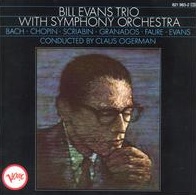
Bill Evans Trio with Symphony Orchestra is an album by American jazz pianist Bill Evans and his trio, released in 1966, featuring jazz arrangements of works by classical composers Granados, J.S. Bach, Scriabin, Fauré, and Chopin. The trio is accompanied by an orchestra consisting of strings and woodwinds arranged and conducted by Claus Ogerman. Originals by both Evans and Ogerman are also included.
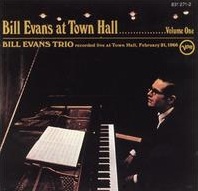
Bill Evans at Town Hall is a live album from 1966 by American jazz pianist Bill Evans and his trio. It is his only commercial trio recording featuring drummer Arnold Wise, and it was the last recorded appearance of bassist Chuck Israels as a regular member of the trio.
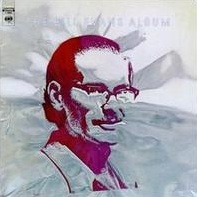
The Bill Evans Album is a recording by the jazz pianist Bill Evans, released in 1971 on the Columbia label. It was his first album to feature all compositions written, arranged, and performed by him. On the record, Evans plays both an acoustic and a Fender Rhodes electric piano.
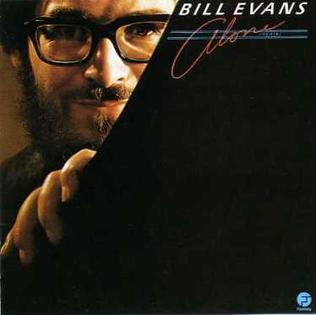
Alone (Again) is a solo piano album by American jazz pianist Bill Evans, recorded in December 1975. A follow-up to his earlier solo album Alone, it was released in 1977 on Fantasy Records and reissued on CD in 1994 by Original Jazz Classics. At the time it was recorded, Evans had been playing an increasing number of solo dates and was inspired after hearing Marian McPartland play solo in Monterey. Evans's manager Helen Keane commented:
As much as Bill enjoyed playing alone at home, and although by this time he regularly included a solo section in his concert program, he found recording in this context very difficult. It was probably the only area he felt insecure about musically, and the fact that he'd gotten a Grammy for Alone didn't seem to help.

Intuition is a jazz album by pianist Bill Evans and bassist Eddie Gómez released by Fantasy Records in 1975.

Waltz for Debby is a 1964 album in English and Swedish by the trio of American jazz pianist Bill Evans and the Swedish singer Monica Zetterlund. Evans met her on a tour of Sweden and was "bowled over" by her EP recording of "Waltz for Debby" with a Swedish text titled "Monicas Vals." Evans's manager, Helen Keane, set up a recording session for them at the end of the Swedish tour.
"Waltz for Debby" is a jazz standard composed by pianist Bill Evans, which became "his most famous tune." He first recorded it as a brief solo piano piece on his debut album, New Jazz Conceptions (1956). Lyrics were added about six years later by Evans's friend Gene Lees. "Debby" in the composition's title refers to Evans's then 3-year-old niece, Debby Evans, whom he often took to the beach.
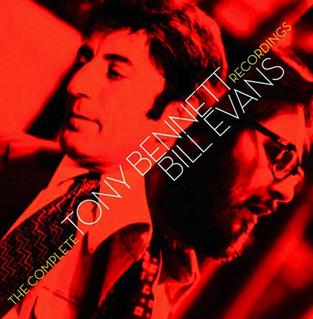
The Complete Tony Bennett/Bill Evans Recordings is a two-CD box set released in 2009 compiling the two recording sessions by singer Tony Bennett and pianist Bill Evans which produced The Tony Bennett/Bill Evans Album in 1975 and Together Again in 1976, including twenty alternate takes and two bonus tracks not released on the original albums.

Montreux III is a live album by jazz pianist Bill Evans and bassist Eddie Gómez, recorded at the Montreux Jazz Festival in Switzerland in 1975 and released on the Fantasy label.

Since We Met is a live album by jazz pianist Bill Evans with Eddie Gómez and Marty Morell, recorded at the Village Vanguard in New York City in 1974 and released on the Fantasy label in 1976. Additional recordings from Evans's 1974 Village Vanguard performances were also issued on the album Re: Person I Knew, released posthumously in 1981. Since We Met was digitally remastered and reissued as a CD in 1991 on Original Jazz Classics.

The Tokyo Concert is a live album by jazz pianist Bill Evans with bassist Eddie Gómez and drummer Marty Morell recorded at the Yūbin Chokin Hall in Tokyo, Japan, in 1973 and released on the Fantasy label.



















